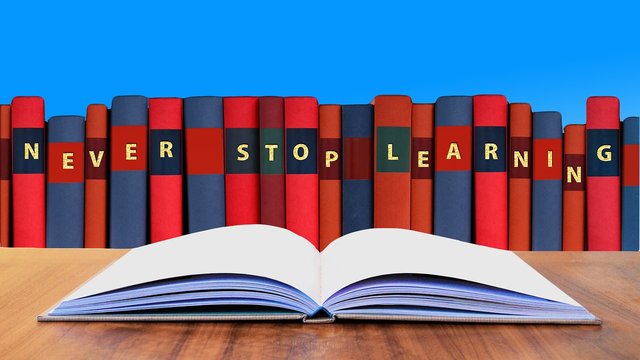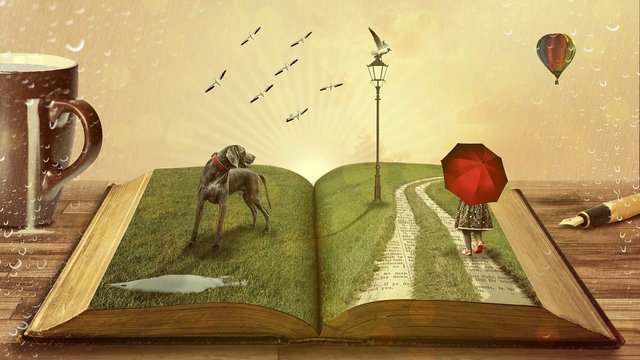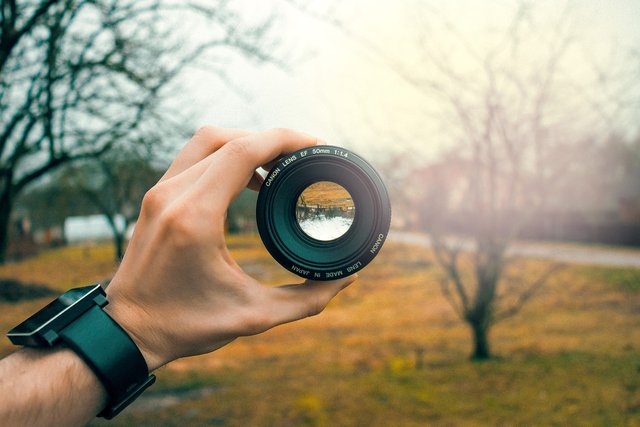KnoWING (NEvER SToP LEARNING)
This post was inspired by @steemstem Being A Member Of The SteemSTEM Community now let us dive in.
To be told that we should never stop learning is a good advice in times where nothing seems forever. And it is difficult to support the opposite. We are chased by news, life and work change quickly and what you have studied ages fast. Creativity and innovation need to be constantly fed by new information. Learning, not being discussed, is fundamental and brings with it an enormous potential for change.
Like all phrases that sound good in a nutshell, it can become a slogan for its own sake. We must learn to learn ... thanks, correct, but also generic. To make a parallel, once they have told you that doing physical activity is good, you know ( almost ) as before. When you're in the mirror, your bacon is still there to greet you.
LEARN TO LEARN MORE
We are bombarded with books-sites-advertising on methods and techniques to increase learning skills, and it is easy to understand why. In a world where data grows at a fast pace, where breaking news hammers incessantly, where the streaming of social media is unstoppable, you need to be equipped to avoid being overwhelmed.
We are all interested in learning about ways to get more information in less time . It's a skill that makes us damn comfortable, especially when we realize that the time available to us is poor.
Methods to read a book in 1 hour, app that synthesize tomes of 300 pages, audiobooks to listen to double the speed, all stratagems to gain time. My advice is this: try them and you will find out that they work ( ! ).
All right, so? Not really. In the medium term you will remember very little of what you have acquired in this way. You can boast of having read 100 books in a year, but the first person to ask you a question that scratches slightly below the surface will catch you unprepared. You will have vague and confused memories.
“It is better to be ignorant in one thing than to learn it badly.”
By Publilius Syrus
In the moment in which you find a book already condensed into 2 pages, or reading it quickly to "jump", you lose all the context that gives depth and nuances to the contents.
It becomes a fact of statistics and personal records. Nothing wrong, but they do not coincide with "knowing". Lots of information available in our brain does not mean knowledge, nor even greater creativity.
LEARN TO LEARN BETTER
I'm not saying that the techniques to improve learning are all to be thrown away. Any process, even the study, can be improved. Pay attention to the miraculous formulas and why you're applying them. Above all, avoid engaging information just for:
a silly demonstration of "mental" strength ( 100 books a year or those stuff you would like to have for dinner with friends )
performance anxiety ( when you want to know everything for fear of losing something ).
Quality learning, the one that brings you personal knowledge and growth, requires a long time of reflection and re-elaboration.
While
Cognitive overload is an ugly beast. Too much information engulfs the brain, in the literal sense of the term. Among the first to talk about information overload was the American writer Alvin Toffler in his essay Future Shock of 1970( a collection of more or less fulfilled predictions ).
Science in the following decades has thoroughly investigated what happens with information binges. After a certain threshold, subjective but still limited, we lose effectiveness ( we become "drunk") and we start not remembering what we are learning. Our brain is really skilled at saving ourselves from ourselves.
An effective mind is not one that absorbs loads of data. It is that, rather, that manages to connect them in useful and creative concepts. There is a difference between decoding information and knowing how to interpret and analyze it .
“You can know the name of a bird in all the languages of the world, and when you're done, you'll know absolutely nothing about that bird ... So let's look at the bird and see what it's doing - that's what matters. I learned very early the difference between knowing the name of something and knowing that something.”
By Richard Phillips Feynman
ATTENTION TO MULTITASKING
When learning to learn is combined with multitasking, perhaps to optimize your busy schedule. You have to give up something.
Russ Poldrack, a neuroscientist at Stanford, claims that acquiring information while doing the other has the result of directing them to the wrong side of the brain . If you are studying and watching TV, for example, what you read ends up in a region dedicated to memorizing specific skills, not abstract ideas and concepts. This will make it much more complicated to retrieve this information later, because usually (studying without TV) they end up in the hippocampus .
Also from Stanford University, comes a study on the "mental cost" of multitasking in terms of productivity and effectiveness. As was foreseeable, there is a decline in the quality of the tasks performed at the same time. The brain can do more things at the same time, but it can do better one at a time .
Even those who think they are good at juggling, actually self-deception , as demonstrated by Daniel J. Levitin of McGill University in Montreal. Take many small, insignificant decisions, for example every time we stop reading an email, it increases our stress level and burns our energies. If on the one hand we feel satisfied because we have completed an activity ( even if small ), on the other we reduce our effectiveness in making important decisions. We waste time, commit trivial evaluation errors and end the day exhausted.
THE FOCUS (STEEMIT)
Quality is important. Better a research book read carefully, or even reread a second time, than 10 titles passed at supersonic speed. Just as optimizing times is one thing, while overlapping random activities is another.
If it is true that study performance can be improved, it is also true that we need to understand what to do with learning . Conceiving it as a challenge of efficiency removes creativity and true knowledge. It's like setting a record for eating pizza in 32 seconds . It can be cool, but it has nothing to do with appetite.
It is necessary to focus and choose how to feed thought . To do this, there are 3 simple questions you should answer :
What do you want to learn? ( choose, not everything that passes under your eyes )
Why do you need to learn that thing? ( what benefit can you get from it )
What quality materials can you use?
The amount of information you find on the web, once you've focused what you need, becomes a precious resource . Live in the age of knowledge, and it can be an advantage instead of an avalanche that overwhelms you. Selecting the one around you, and setting goals, optimize the time and energy available to you.
Furthermore, focusing means focusing on one thing at a time and doing it well. Especially when making a post on steemit which You need to reflect, rework and above all apply what you learn. Reading 5 manuals in a row on photography, for example, will make you progress much less than putting into practice step-by-step what you find in every single chapter of a book.
“The mind is not a vase to be filled, but a fire to be lit.”
By Plutarch
The ability to learning and knowing is crucial in the development of creativity and allows you to adapt to changing situations. But do not worry about the amount of information available, there will always be more than what you can manage. Focus on what to choose and how to turn it into knowledge .



Thank you for sharing ♥ @afifa
thanks for info nice post @afifa
Man in nature always remains the easiest way to learn Vtjdh summarizes the things shortened originally
In this age of pure information became available to all and without charge
Thank you for this publication
Such a useful and informative post
every day we have the opportunity to learn something new. thanks for the info @afifa
truly picking off little bits of knowledge can help one's intellect grow.
@afifa keep learning keep growing :)
this must helps , very informative!